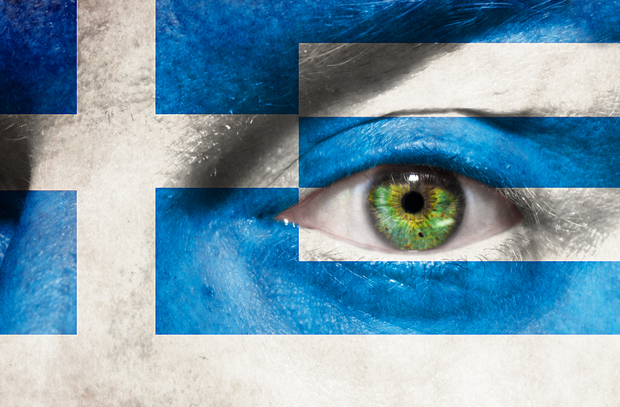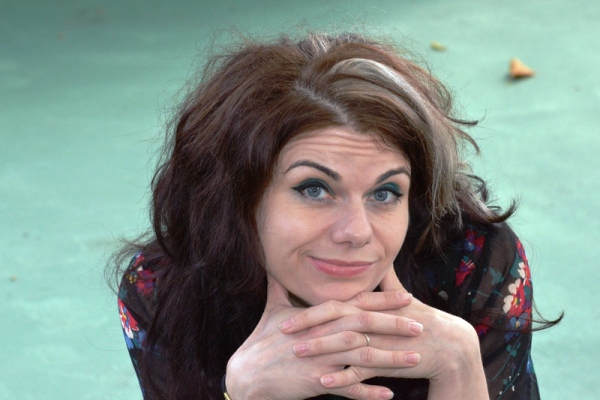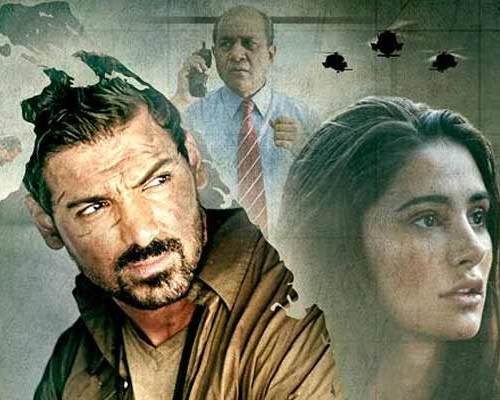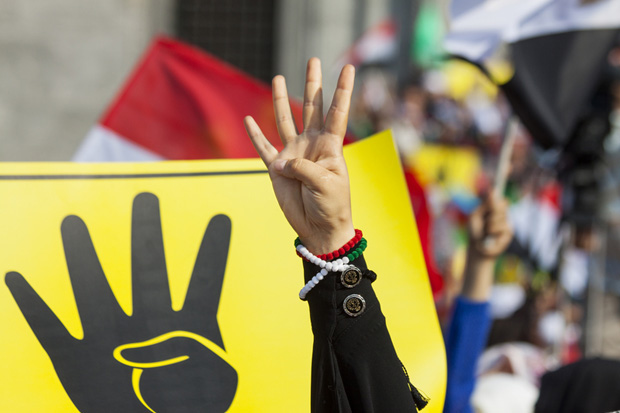Index relies entirely on the support of donors and readers to do its work.
Help us keep amplifying censored voices today.

(Photo illustration: Shutterstock)
As Greece prepares to take on the presidency of the Council of the European Union on January 1, the country continues to grapple with the free expression fallout from its financial crisis.
The Greek constitution protects freedom of expression in Article 14, a very lengthy provision detailing the rights and restrictions. As set in the first paragraph of Art. 14 “every person may express and propagate his thoughts orally, in writing and through the press in compliance with the laws of the State”.
Aside from domestic legislation, Greece cooperates with a number of international organizations and is a contracting party to treaties related to freedom of expression, civil/political rights and access to information, for instance the European Convention on Human Rights and the International Convention on the Elimination of All Forms of Racial Discrimination.
However, the heavy austerity measures imposed since 2010, after the fiscal agreements between the Greek government and the “troika” (IMF, European Commission, European Central Bank), resulted in serious violations of human rights including freedom of speech. Cuts in government spending forced impoverishment upon large segments of society and came with a heavy price of social exclusion and marginalization.
Reports from various intergovernmental organizations, NGOs and civil society groups are raising alarms about policies followed by the Greek state. Human rights such as free expression, free thought, free movement, right to work, equal treatment, access to decision-making and right to protest are being systematically attacked.
On 16 April 2013, Nils Muižnieks, the Commissioner for Human Rights of the Council of Europe, published a report on human rights issues. Muiznieks urged the Greek government to use all legal instruments, domestic and international, to combat hate speech and racist crime, largely attributed to the rise of the neo-nazi party Golden Dawn.
Government Transparency: call for social justice
Looking at the evidence coming from official institutions and NGOs, the “pillar” of government accountability is characterized by corruption and maladministration.
Although “micro-corruption” is less of a problem, mainly due to economic problems, Greece is still perceived as the most corrupt nation in the European Union. In a total of 177 countries worldwide, Greece ranks 80, although some progress has been made from last year.
According to the 2012 annual report of the Greek Ombudsman, a constitutionally sanctioned independent authority investigating administrative actions regarding personal rights, “the call for social justice is the main feature of people’s complaints, reflecting the existing social fatigue.”
After evaluating the significant increase in the number of complaints, the Ombudsman reported that citizen encounters with the administration have intensified, while the explosive social conditions have lead to greater loss in human rights protection.
Press Freedom: under attack
Greece’s dramatic fall in the ranking of 2013 World Press Freedom Index, is evidence of the oppressive environment journalism is practised. Since 2008, Greece has fallen from 31 place to 84.
In the past three years, mainstream media have been experiencing a significant deterioration in their “watchdog’ role, as a result of the crisis and of long-term weaknesses and practices.
The Greek media market is shaped by media groups owned by magnates, shipowners and big contractors. Having vested interests in profitable industries, these tycoons have been working closely with every regime to ensure their dominance at any cost.
In additiona, the financial crisis has led to closures and severe cutbacks at print and broadcast outlets while hindering effective reporting and quality journalism.
Ιndex on Censorship has thoroughly reported on politically motivated firings or suspensions at both state and private media.
The case of investigative journalist Kostas Vaxevanis is an indicative example of the governments’ approach to press freedom. Vaxevanis was arrested and prosecuted after publishing a list of more than 2,000 suspected tax evaders, the so called “Lagarde list”.
Moreover, Reporters Without Borders, in a special investigation report dating from September 2011, suggested that a crisis of confidence in journalism has resulted to a devaluation process of the profession. RWB highlighted the risks entailed in reporting at street demonstrations and violent clashes with the police: “Working conditions during demonstrations are nowadays rather like in a war zone”.
During the crisis, the need for more investigative reporting led several bloggers and online activists to form independent media collectives.
While mainstream media failed to report on the social struggle, these collectives managed to report complaints and publicise dissent. But not without a cost. On April 11 2013, Indymedia, an anti-authoritarian internet collective, had its plug pulled by the government for reporting on police brutality cases and exposing the deeds of neo-fascist Golden Dawn.
In late September 2012, the case of Elder Pastitsios showed that online satire cannot be tolerated. A 27-year-old man, who published a Facebook post mocking a well known Orthodox monk, was arrested on charges of malicious blasphemy and religious insult.
It’s perhaps the first time an internet company disclosed information to the Greek authorities in order to identify an individual accused of an alleged offense relating to religious satire.
LGBTI: Living in a conservative society
Several incidents of state censorship and social discrimination on the grounds of sexual orientation illustrate the mentality of an oppressive society.
According to IGAL’s Annual Review Greece ranks 25 among 49 European countries. A wave of violence has been recorded against LGBTI activists and supporters, from conservatives, extremists and supporters of the Golden Dawn party.
In 2013, (ex) Greek State television ERT decided to censor a kissing scene between men from the TV drama Downton Abbey. Following the reactions from the LGBTI community and the intervention of Greek Ombudsman, the broadcaster issued a communiqué apologizing for the “unfortunate decision”.
It is worth noting that Greece has been found violating the European Convention of Human Rights, regarding its decision to exclude same sex couples from the institution of civil partnership. Although the government plans to extend the legislation to same sex couples, there are continuing pressures from conservatives as well as from the Church.
The impact of orthodox religion to Greek society is so strong that sometimes it can be an obstacle in the perception of artistic attempts. Recently, it lead to the intimidation and persecution of a theatrical play whereby homosexuality was used as a narrative technique.
Migrants, asylum seekers, Roma: the most vulnerable
Human rights abuses against immigrants, asylum seekers and other minorities in Greece have escalated dramatically. The approach of the Greek government — together with the racist attacks organized by Golden Dawn — suggests a police-regime with almost no respect to human life.
Under stricter requirements of acquiring citizenship and with an inadequate asylum system, immigrants and refugees are “trapped” in a country with substandard detention conditions at camps and prisons. Despite reported improvements at the appeal level of the asylum procedures, Greece has made very little progress in establishing a fair and humane system.
Police mistreatment and xenophobic behaviuor from the authorities is a key factor in depriving immigrants and refugees of basic human rights. Allegations of torture and ill-treatment have been largely reported and condemned by international courts and human rights organizations.
Although the anti-racism bill, which is under discussion in Parliament, holds provisions/sanctions for hate speech and incitement to violence, it does not address problems regarding the reporting of racist incidents and the prosecution of racist violence.
Last, but not least, the fundamental right to education for all citizens is not yet granted. The country has been found discriminating against Roma children by segregating them in separate schools.
Women and children
The harsh economic conditions imposed upon Greek population seem to affect women and children more than others.
Even though the number of complaints from women is consistently low, both at a national and European level, documented domestic violence has increased by 47% in recent months. Verbal abuse, economic blackmail and sexual humiliation are among the most common types of violence against women.
Unemployment and precarious employment affect women more than any other social group. There are documented cases of work discrimination during pregnancy and maternity.
Unfortunately, marginalization of Greek women does not stop there. The unprecedented shocking story of 31 women, forcibly tested for HIV and prosecuted for intentionally causing grievous bodily harm, is strong evidence of a police-state that shows no respect to medical confidentiality and above all human dignity. Amnesty International and Human Rights Watch have accused Greece of violating human rights in the case.
The state of children in Greece is in no better position, in fact it is in a critical status. Almost 600.000 are living below the poverty line, while half of them lack the basic nutritional needs. Things are far worse, when it comes to refugees and asylum seekers: both women and children have been victims of xenophobic violence.
This article was originally published at indexoncensorship.org
Journalists are known for uncovering the truth. What is less known is how these journalists gather these facts, often risking their jobs, and sometimes their lives, to discover information others are attempting to keep hidden from the world.
The Taksim Gezi Park Protest
The Gezi Park protest in Turkey made international news when, in May 2013, a sit-in at the park protesting plans to develop the area sparked violent clashes with police. What didn’t grab the attention of media workers worldwide was that at least 59 of their fellow journalists were fired or forced to quit over their reporting of the events.
The Turkish press have been long-time sufferers of the need to self-censor in an environment where the press is ultimately run by a handful of wealthy individuals. The Gezi Park protests saw a surge in the controlling influence of the Turkish media as 22 journalists were fired and a further 37 forced to quit due to their determination to cover the clashes for a national and international audience, as was their duty as journalists.
Turkey came in at 154th in the Reporters Without Borders Freedom of the Press Index 2013, a drop of six places from 2012.
Journalists imprisoned
2013 was the first year a detailed survey was carried out by Reporters Without Borders which looked into how many journalists had been imprisoned for their work; the result was shocking. One hundred and seventy eight journalists were spending time in jail for their actions, along with 14 media assistants. Perhaps more worrying was the statistic that 166 netizens had been imprisoned, those who actively supply the world with content often without being paid whilst gaining access to places that many ‘official’ journalists are banned from.
China handed out the most prison sentences during 2013 with 30 media personal serving time behind bars. Closely behind was Eritrea with 28 journalists imprisoned, Turkey with 27, and Iran and Syria handing out 20 sentences each.
Press freedom in Afghanistan
Murder, injuries, threats, beatings, closure of media organisations, and the dismissal for liking a Facebook post have all accounted towards the 62 cases of violence against the media and journalists working in Afghanistan over the past eight months. The Afghanistan Journalists Center, which collected the data from January to August 2013, has claimed that government officials and security forces, the Taliban, and illegal armed groups are behind the majority of attacks.
Of particular concern is the growing threat to female journalists who have been forced to quit their jobs after threats to their families.
According to the Afghanistan Media Law; every person has the right to freedom of thought and speech, which includes the right to seek, obtain and disseminate information and views within the limit of law without any interference, restriction and threat by the government or officials- a law Afghanistan does not appear to be upholding.
Exiled journalists
Some journalists are taking a risk every day that they go to work. They may not be killed for their reporting but that does not stop them facing imprisonment, violence, and harassment. Between June 2008 and May 2013 the CPJ found that 456 journalists were forced into exile as a means of protecting their families and themselves due to their determination to uncover the truth.
The top countries from which journalists fled included Somalia, Ethiopia and Sri Lanka with Iran topping the table having forced a total of 82 journalists into exile. Although a majority of these journalists claim sanctuary in countries like Sweden, the U.S and Kenya, only 7% of those exiled since 2008 have been able to return home.
Impunity
Murder is a crime for which those involved should be punished. Yet in the case of the killing of journalists nine out of 10 killers go free. Put another way, in only five percent of cases for the murder of a journalist does the defendant receive a sentence of full justice. The most likely reason to kill a journalist is to silence them from speaking the truth to others.
IFEX, global freedom of expression network behind the International Day to End Impunity campaign said: “When someone acts with impunity, it means that their actions have no consequences. Intimidation, threats, attacks and murders go unpunished. In the past 10 years, more than 500 journalists have been killed. Murder is the ultimate form of censorship, and media are undoubtedly on the frontlines of free expression.”

2013 in the UK was the year social media became a “how” rather than a “why” issue. We’re no longer explaining what people do on the web, now we’re discussing how we behave. And we talked most about the abuse and threats received by many women on Twitter. When writer Caitlin Moran proposed a one-day Twitter boycott in August, Index’s Padraig Reidy responded. Read here

Communal censorship reared its ugly head in the UK when Madras Cafe, a Bollywood action film, was withdrawn from cinemas after protesters claimed it was anti-Tamil. Salil Tripathi likened the incident to the rows over Gurpreet Khaur Bhatti’s Bezhti and Salman Rushdie’s Satanic Verses

When Guardian columnist Suzanne Moore found herself at the centre of a storm after an article in which she described the idealised body shape of a “Brazilian transexual”, the Observer took the entirely sensible decision to commission Moore’s old friend Julie Burchill to defend her. The effect was described neatly by tweeter Stuart Houghton: “Julie Burchill has poured oil to calm troubled waters. Then drowned some seabirds in the oil. Then set fire to the oil.”
Index on Censorship refrained from getting involved. Until a government minister did…

Oh, Internet (there was a free speech point to this, honest)

As protesters filled Istanbul’s Gezi Park this summer, Ece Temelkuran explained the Turkish government’s fear of the social media generation.
 In a new sign that Egypt’s military-backed regime is widening its crackdown on dissent, three prominent activists and symbols of the January 2011 Revolution were sentenced to 3-year jail terms by a Cairo court this week.The court also ordered the activists to pay a fine of LE 50,000 each .The case has fuelled fears of increased government repression in a country wracked by violence since the toppling of Islamist President Mohamed Morsi by military-backed protests in July.
In a new sign that Egypt’s military-backed regime is widening its crackdown on dissent, three prominent activists and symbols of the January 2011 Revolution were sentenced to 3-year jail terms by a Cairo court this week.The court also ordered the activists to pay a fine of LE 50,000 each .The case has fuelled fears of increased government repression in a country wracked by violence since the toppling of Islamist President Mohamed Morsi by military-backed protests in July.
On Thursday, founder of the April 6 Youth Movement Ahmed Maher, member of the group’s political bureau Mohamed Adel and political activist Ahmed Douma began a hunger strike to protest “harsh treatment” at Cairo’s Torah Prison where they are being held. The pro-democracy activists were among 51 activists detained last month after organizing a demonstration to protest a controversial new law that the government claims will “regulate protests”. They were accused of allegedly “assaulting police officers, thuggery and organizing a protest without obtaining a permit from the authorities.” Rights groups have condemned the jail sentences, expressing concerns that the Egyptian authorities were “reversing the hard-earned gains of free speech and assembly acquired following the January 2011 uprising that toppled Hosni Mubarak.
In a statement posted on the April 6 website, the activists denounced the “inhumane conditions” they have endured in prison . They also complained of maltreatment and abuse by fellow inmates.
The activists’ statement coincided with a government announcement that the Muslim Brotherhood had been declared a “terrorist organisation”–a move signaling further marginalisation of the Islamist group in the bitterly polarized country .The government decision came a day after a fatal suicide bombing that targeted the Security Directorate in the Nile Delta city of Mansoura. At least 12 people were killed and 130 others were wounded in the attack for which a Jihadi group – Ansar Beit al Maqdis–later claimed responsibility. Despite the Muslim Brotherhood’s denunciation of the terror attack on their official website Ikhwanweb, the government announced plans to criminalize the group’s activities and freeze its funds–a move the analysts feared would lead to greater radicalization of the group and plunge the country into civil strife.
General Coordinator of the April 6 Youth Movement, Amr Aly criticised the government decision saying that ‘branding the Brotherhood a terrorist organisation would not halt the attacks but would end hopes for stability, plunging the country in a state of chaos.”
As Egyptians were still reeling from the shock of Tuesday’s deadly bombing in Mansoura, news broke of a second blast in Cairo’s residential neighborhood of Nasr City on Thursday . The latest explosion–caused by a homemade bomb–injured five passengers on a bus.raising fears of a fresh spate of attacks ahead of a popular referendum on the new constitution scheduled for mid January.
Hours after Thursday’s attack, 16 Muslim Brotherhood supporters were arrested in the Nile Delta province of Sharkiya on charges of “promoting the ideology of the Muslim Brotherhood group, distributing leaflets, and inciting violence against the army and police.” Egypt’s privately-owned TV channel CBC meanwhile, announced the numbers for a new Hotline, urging citizens to report people they suspect of having links to the “terrorist group.”
The recent repressive measures have been described by analysts as a “dramatic escalation in a long-running feud between Egypt’s security agencies and the Islamist group intended to paralyse the latter and block any space for the Brotherhood in the political process.” But with the crackdown now expanding to target secular revolutionary activists, many are concerned that Egypt’s “democratic transition” may have taken a wrong turn, leaving the country on the brink of a civil war that may tear it apart.